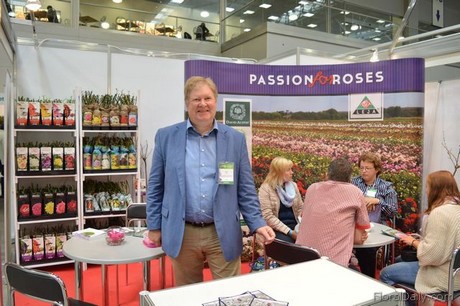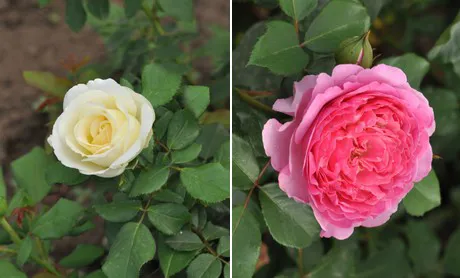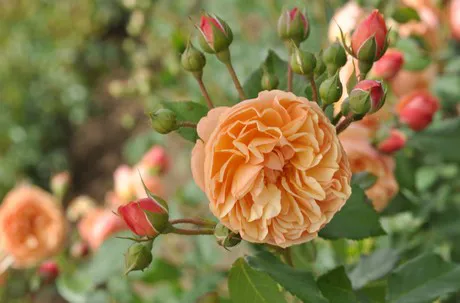
Peter Cox at the FlowersExpo in Moscow, Russia.
New player in rose breeding
Pheno Geno Roses is a Serbian-Dutch company and is not only a new player in the cut rose breeding industry, but is still in the garden rose breeding. It is a daughter company of garden rose nursery Roath in the Netherlands, a company that has been cultivating garden roses for over 60 years. In October 2015, Pheno Geno have put their first own bred garden roses, grown at their nursery in Serbia, on the market in France. Currently, Pheno Geno has an office in the Netherlands where they do research and cross varieties and an office in Serbia that crosses and tests the varieties.
Interest fragrant roses
In their eight years of breeding, Pheno Geno developed a wide range of garden rose varieties and their Fragrant Frayla® Collection show their best selling varieties at the moment. "The garden roses in this collection have large flowers and have a strong scent", says Cox. Last year, Peter often has been asked if these roses can be used for cut rose production. "This demand, made us decide to start testing our garden roses and see if they are suitable or if we can make them suitable for cut rose production."

Fragrant Lenka Frayla® and Fragrant Mileva Frayla®.
From garden rose to cut rose
Cox points out that making a garden rose suitable for a cut rose production is not that easy and will probably take another couple of years of breeding and testing. "Cut rose breeding is something new for us, so we first have to discover the genetic background of the cut rose, breed new roses and test them at growers in the Netherlands. We will focus on the yield/production volume per square meter, the appearance and the shelf life. I think it will take about two years."
Large diversity garden rose mother plants
According to Cox, the large diversity of garden rose mother plants is promising for breeding and introducing new cut rose varieties to the market. "Over the years, cut rose breeders achieved to breed roses with a high production per square meter in many colors, which result in a high yield for the grower. The shape of the flower and the scent was often not their priority and due to the small number of mother plants they are also limited in breeding cut roses with new shapes and scents", says Cox. According to him, the garden roses offer more opportunities to create new varieties as they have more and a larger diversity of mother plants. "When looking at the genetic background, the cut - and garden roses share the same 'parents' but the garden roses seem to have many more. Theoretically speaking, this will enable us to breed cut roses with in a wider range of shapes and scents", he says.
Cox identifies long shelf life as a major challenge when breeding scented roses. "When looking at the scented cut roses that are on the market at the moment, we often see that these roses have a shorter shelf life then the 'regular' cut rose. We will probably have to deal with this challenge too." However, with their, as Cox describes, 'special' breeding technique, they hope to tackle this disadvantage."
Breeding technique
"In general, breeders cross varieties and have a lot of experience, which enables them to create new and good cut roses. We, in contrast, are new in the breeding industry, so we lack this experience. However, with our breeding technique, this experience is not essential anymore. We identify the genes of the garden rose and develop an array of SNP markers. Each marker stands for a characteristic of the roses. So, for the cut roses, we will try to find the traits that determine the scent and the shelf life of the flower."

Edible rose.
Edible roses
Next to developing scented cut roses, Pheno Geno has been working on breeding edible garden rose varieties and are now testing them in the Netherlands and Thailand. Over the last months, several varieties have been tested by consumer panels and Michelin star chefs regarding looks and taste. But also regarding healthiness, they have been tested and the results are pleasing. "In general, flowers do not taste that well, but there are some varieties that have a very good taste. Besides that, it has been showed that some of our edible roses contain a hundred times more antioxidants compared to blueberries, some are a source of vitamin C, and some have both."
For more information

Pheno Geno Roses
Peter Cox
Email: peter.cox@roath.nl
www.phenogenoroses.com
